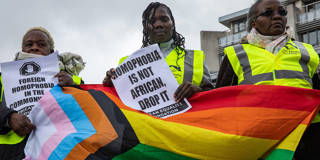Uganda’s Anti-Homosexuality Act, which President Yoweri Museveni signed into law in May, violates the fundamental human rights of the country’s LGBTQ+ community, imposing harsh punishments – even the death penalty – on adults who engage in consensual sexual acts. The Ugandan constitutional court must not allow it to stand.
KAMPALA – In the 1990s, as a 15-year-old high-school student in Uganda, I was a member of a “writers’ club” that would summarize for our fellow students key articles from the lone copy of the local newspaper our school received each day. One day, I was assigned a “news” article identifying the schools that were suspected of condoning or supporting homosexuality – and the students who were suspected of being gay. As I worked, my stomach ached for all the young people who would be shamed, ostracized, and even beaten by their communities for their sexuality or gender identity. It ached for me, too, because I already knew – but had not said out loud – that I was queer.

KAMPALA – In the 1990s, as a 15-year-old high-school student in Uganda, I was a member of a “writers’ club” that would summarize for our fellow students key articles from the lone copy of the local newspaper our school received each day. One day, I was assigned a “news” article identifying the schools that were suspected of condoning or supporting homosexuality – and the students who were suspected of being gay. As I worked, my stomach ached for all the young people who would be shamed, ostracized, and even beaten by their communities for their sexuality or gender identity. It ached for me, too, because I already knew – but had not said out loud – that I was queer.